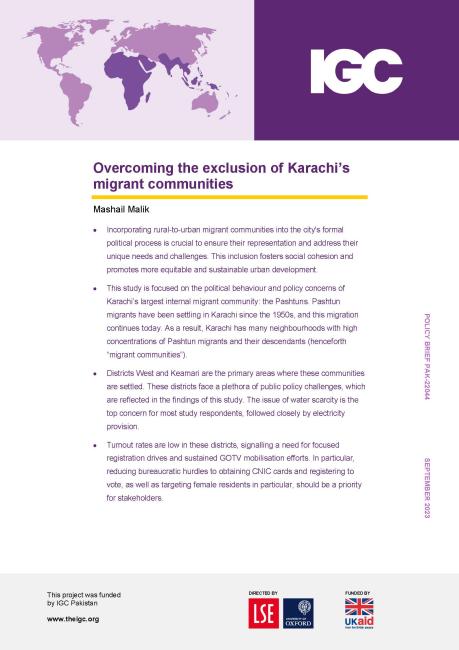The political incorporation of rural-to-urban migrants in Karachi, Pakistan
Does migrant participation in the political life of cities impact policy outcomes and citizen satisfaction? This project aims to look into possible solutions to address the inclusion of migrants and investigate how this can be encouraged. Particularly looking at whether an increased sense of ownership over the city can increase investments made in politics.
How can migrants be incorporated into the political life of cities, and does their participation impact urban policy outcomes, local governance, and citizen satisfaction? Overlooking the inclusion of rural-to-urban migrants means we risk misunderstanding key governance challenges facing rapidly urbanising cities.
The World Bank’s Karachi City Diagnostic (2018) cites the dense concentration of migrant populations in informal settlements as posing an immediate challenge to the city’s further growth and competitiveness. The governance structure’s neglect of migrant-dominated informal settlements has led to the growth of criminal and often violent informal service delivery agents known as the “water tanker mafia” and “land mafia” etc.
While the problems are well known, the solutions are less understood. My research asks whether challenges can be addressed by the political inclusion of migrants. First, we will ask what causes political participation among rural-to-urban migrants in the developing world’s growing cities, then we will investigate how greater migrant participation can be encouraged.
This study will answer these questions through a baseline survey and field experiment measuring and encouraging the political participation of internal migrants in Karachi, Pakistan. This will particularly test whether increasing migrants’ sense of "psychological ownership" over the city can increase the investments they make into urban political life.
Collecting this data of political incorporation of migrants within a rapidly growing megacity will improve the lack of knowledge on a process central to navigating the new landscape of an increasingly urbanising world.



